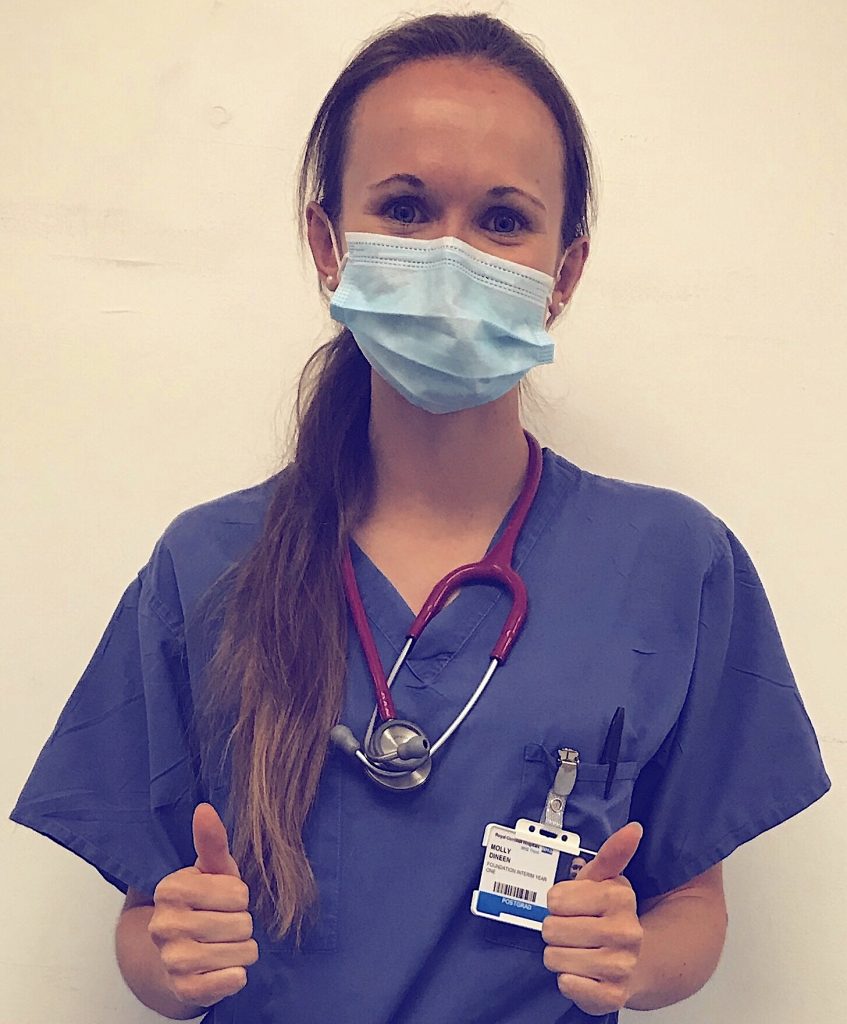
There has been lots of interest in the experience of doctors in FiY1 posts over the last few months. Dr Molly Dineen has been working as FiY1 in Truro. Here she shares some of her experiences.
~
At the end of February I was travelling to New York for my medical elective, excited for the two months which I was about to spend in the USA and South Africa. Two weeks later I was on my way home, as COVID-19 began to spread across the globe and just a few weeks after that, I was starting work as a junior doctor in the NHS.
The decision to graduate early and start work, three months earlier than expected, was not an easy one. I was aware I would be entering the NHS at a challenging time, but ultimately I wanted to do my bit to help, and to relieve pressure on the more senior doctors who were already working so hard.
I was lucky to have had lots of clinical experience throughout my medical degree at Exeter and having completed our final exams at the end of our fourth year, the last year was focused on gaining experience in practice. This clinical experience meant I felt ready to take on the role of an interim Foundation Year 1 doctor. I felt privileged to be in a position where I could use the skills gained over the last five years to help.
I started working at the Royal Cornwall Hospitals Trust (RCHT) on the Acute Medical Unit, seeing all medical admissions, of all ages and conditions. Starting work as a junior doctor in the middle of a worldwide pandemic was quite frankly terrifying, but the experience turned out to be enjoyable and rewarding.
The biggest challenges that I experienced were adapting the skills learned during medical school to the new environment where we were social distancing and wearing personal protective equipment. Whilst our number of covid-19 cases remained low, we still worked to prevent further spread. I had to communicate with patients through a mask, using only my eyes to express my thoughts and only my patient’s eyes to understand their emotions. I had to re-learn to conduct basic examinations at a safe distance with protective clothing on, and to take a full history from a patient without paper notes, to reduce contamination.
I had to adapt to this new environment in a matter of hours as I also adjusted to being a new doctor. I had to attempt to ignore all that was going on around me as I faced the challenging questions: “Do you think its cancer?”, “Is she going to die?”. It had been easy to forget that in many ways life continued despite the restrictions, and returning to the hospital was a clear reminder of that.
The whole team I worked with – nurses, doctors, physiotherapists, occupational therapists, ward clerks, porters, cleaners, physician associates and emergency medical technician – remained positive and upbeat despite the challenges. There was a great sense of team spirit and I have felt so lucky to be welcomed into this team of people who have been working so hard for many months through the Covid-19 pandemic.
As lockdown rules continue to ease, there will be many more people heading back to work, adapting their own environments and putting themselves at risk in order to help us all move back to normality. I hope that we all continue to work as one big team to reduce the spread of Covid-19 and that we respect the challenges that everyone faces. My new understanding of the challenges, even in an area which has been less affected than some, has emphasised the importance of this to me. The fewer the cases, the fewer restrictions we will have on access to healthcare and the more normal life can become again.
~
Blog adapted from articles here and here. Many thanks to Molly for allowing us to reproduce her words.
Molly has also kept a video diary which was featured on BBC News: https://www.bbc.co.uk/news/av/uk-england-hampshire-53219810/coronavirus-junior-doctor-keeps-pandemic-video-diary
Don’t forget, participants in this project can contribute their own stories to our analysis through the free text link included in the questionnaire email.
